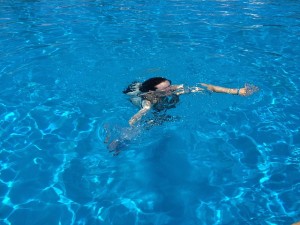If you have started swimming and have decided to take this new hobby seriously, you are probably worried about how to improve your endurance when swimming. This is an issue that worries most people who follow this sport, since even if they evolve very quickly in it, there always comes a time when evolution seems to stop and this happens due to our lack of resistance.

If this is your case, you should not worry. Improving endurance when swimming is possible, although it will take some time and will require dedication and perseverance. The first thing you need to know is that you shouldn’t overwhelm yourself trying to improve your swimming stamina. To a certain extent, it is something that will occur normally and progressively as you continue with your training. You must remember that the most important thing is to enjoy swimming, which is a very good sport for our health. When you become obsessed with improving endurance when swimming, the most common thing is that you get frustrated and you can’t see the results, so the first thing you should do is relax and try to enjoy the sport you do.
To improve resistance when swimming, you must incorporate a series of exercises into your weekly practices. These exercises are not only designed to improve swimming endurance but will also help you improve your swimming technique. If you want to know which are the exercises that help you improve your resistance when swimming, pay close attention to the following instructions.
What do you need to improve endurance when swimming?
- Effort, tenacity and patience
Instructions to improve endurance when swimming
- Change style: the most common thing when we start swimming is that we feel more comfortable in a certain style. As a consequence we tend to repeat the same style over and over again. Although doing this gives us the impression of improving a lot in a certain style, it is nothing more than a false illusion. At first, this evolution does occur, but then our body gets used to always making the same effort and our evolution stops short. If you want to improve your technique and your resistance you have to get used to changing your style. Ideally, you should make the change of style every two lengths. In this way you will work different parts of your muscles and your body will have to continuously adapt in exchange for exercise, which will result in an increase in your resistance and efficiency when swimming.
- Make series: just like when running, the series become one of our best allies when swimming. By doing series you will be increasing, in an extraordinary way, your resistance. Swim for about two hundred meters and rest two minutes between each set.
- Long strokes: when we begin to swim, it usually gives us the impression that we cannot stand with our heads underwater. While swimming we feel the need to lift our head out of the water in order to breathe. As a consequence we take short and fast strokes. The result of this behavior is that we end up hyperventilating. The ideal way to increase our resistance is, against our instincts, to make long and short strokes. You must force your breathing to match the stroke. In order to achieve this you must remain very calm and calm. Go increasing the length and duration of the strokes little by little. In a very short time you will notice immediate improvements.
- Do breathing exercises: as a complement to the practice you do in the pool, you should spend a few minutes doing breathing exercises. For this you must be very relaxed. Start by taking very deep breaths for 4 counts, then hold the air in your lungs for another 4 counts, expel the air in 4 counts and remain in apnea for another 4 counts. Little by little, increase the times in series of 4/8/4/8 and 4/12/4/12. These exercises will help you expand your lung capacity and endurance.
Tips to improve endurance when swimming
- Remember that the best way to improve endurance when swimming is to practice swimming regularly. It won’t do any good if you go swimming every day for two hours for a week if you don’t go back to the pool for two or three weeks afterwards. A short and regular practice is better than a long and irregular one.
